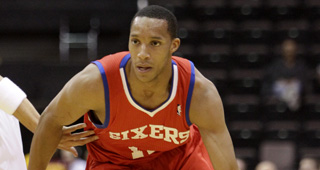Even if the Philadelphia 76ers are able to win a road Game 7 in their second-round series against the Boston Celtics, they would be a huge underdog against either the Miami Heat or the Indiana Pacers in the Eastern Conference Finals. Going from “good” to “great” is the hardest jump to make in the NBA and the 76ers don’t have the personnel to do it.
Their problems start up front: in a league where size is everything, they don’t have a big man who can create his own shot or play above the rim defensively. With an excellent trio of perimeter players in Jrue Holiday, Lou Williams and Andre Iguodala, the 76ers are one elite 6’10+ big man away from being relevant. However, those are the toughest players to find in the NBA, which is why the decisions they made in the 2010 draft still loom over the franchise.
After almost a decade of wandering through the mediocrity treadmill since Allen Iverson’s decline, Philadelphia had a top-5 pick for the first time since 1997. There were several high-upside big men on the board, but the 76ers played it safe and took Evan Turner, the consensus No. 2 player in that draft.
If they had taken DeMarcus Cousins, Greg Monroe or Derrick Favors, they would have changed the entire trajectory of their franchise. Now, they seem doomed to follow in the path of the Atlanta Hawks, another perennial playoff team crippled by a disastrous draft miss at No. 2 overall (Marvin Williams over Chris Paul and Deron Williams).
It’s easy to understand why they took Turner: he was the National Player of the Year at Ohio State, a do-everything point forward who averaged 20 points, nine rebounds and six assists for an Elite Eight team. At the same time, Cousins, Favors and Monroe all had significant red flags coming out of college.
Favors averaged only 12 points and 8 rebounds a game for a middling Georgia Tech team that lost in the second round of an NCAA Tournament. Monroe nearly averaged a double-double as a Georgetown sophomore, but the Hoyas underachieved in his two seasons there and he was plagued by concerns about his passivity against smaller college big men. Cousins, meanwhile, was a walking discipline problem in his one season at Kentucky, raising concerns about how he would handle the money and pressure of being a high draft choice.
But while Turner had an almost impeccable college career, there should have been serious questions about his ability to translate his game to the next level. He’s an excellent passer and rebounder for his size, but he’s an average athlete without a consistent jump-shot. A perimeter player who can’t stretch the floor, defend at a high level or consistently score in the paint shouldn’t be a top-5 pick.
These playoffs have exposed the holes in his game: he has a PER of 12.4, and his inability to stretch the floor (shooting 35.6% from the field and 0% from beyond the arc) has hamstrung Philadelphia’s offense against Boston. Floor spacing is essential for an NBA offense, and whenever Turner is on the floor, the Celtics can essentially use his defender as a second line of defense against the 76ers other guards.
In contrast, the three young big men Philadelphia passed up for Turner would all have been a serious problem for an undersized Boston team. Garnett, in his 17th season in the NBA, isn’t built to bang in the paint for a seven-game series. Brandon Bass is a 6’8 jump shooter and Ryan Hollins isn’t really an NBA-caliber player.
Favors, an elite athlete at 6’10 250, has flashed Defensive Player of the Year potential while averaging 15 points and 10 rebounds per-36 minutes. Monroe is already one of the NBA’s best passing big men, averaging 15 points, 10 rebounds and three assists a game as one of the lone bright spots in Detroit. Cousins’ attitude problems haven’t gone away in Sacramento, but he’s still a 6’11 270 big man who can create his own shot.
All three have holes in their game that could prevent them from being All-NBA players: Monroe and Cousins aren’t athletic enough to be top-level defenders while Favors doesn’t have the skill level to be a primary offensive option. However, each are good enough on one side of the ball to be part of a championship-level front-line.
Turner’s best case scenario, meanwhile, is a sixth man who creates shots on a second unit. He needs to dominate the ball to be effective, but he’s not good enough to be a primary offensive option.
Cousins, Monroe and Favors were all serious gambles coming into the NBA, but their upside was much higher than Turner’s. And in the NBA, if you’re going to gamble, you are almost always better off going big.
It’s a good reminder for the 2012 draft, which is filled with high-risk, high-reward 6’10+ prospects. While Sam Bowie over Michael Jordan and Greg Oden over Kevin Durant are a part of NBA draft lore, passing on a big man can be just as devastating.

Jonathan Tjarks wrote on the NBA for RealGM from 2011-2016 before joining The Ringer.
Follow @JonathanTjarks on Twitter.


